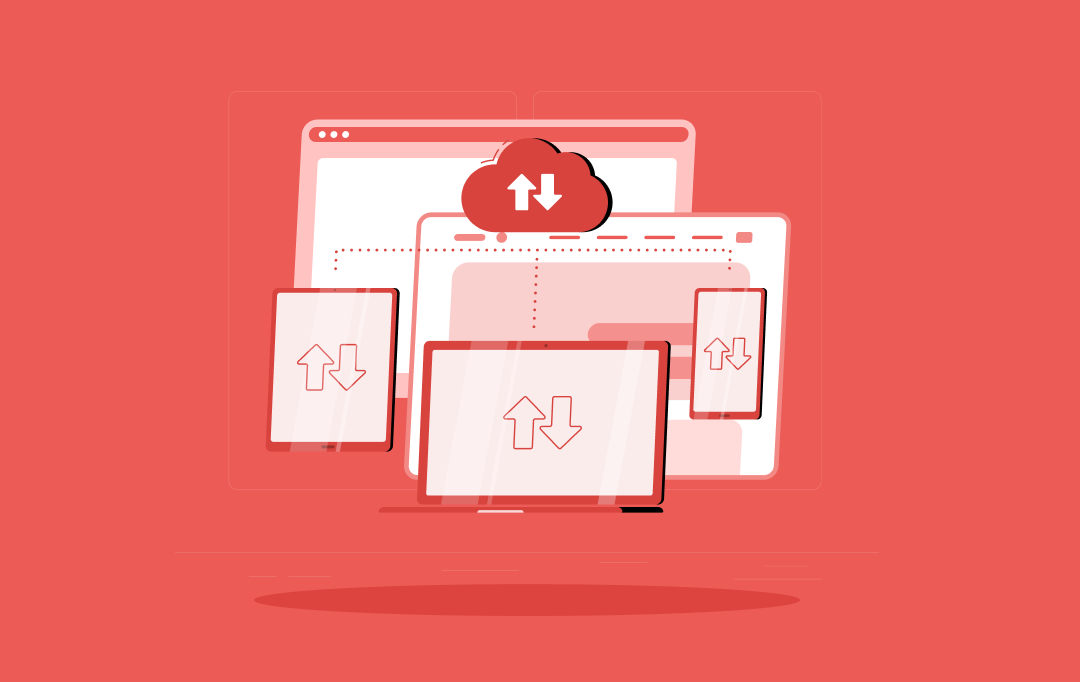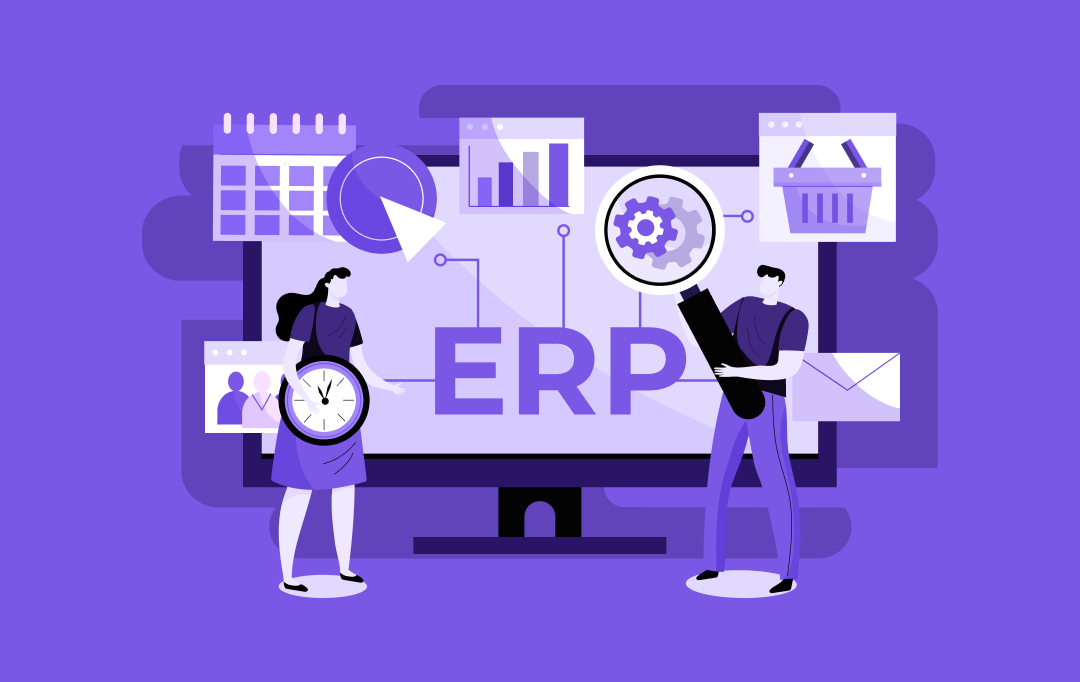Key takeaways:
- 77% of companies are prioritizing digital transformation; the right tech approach is crucial for staying competitive.
- Custom development offers tailored solutions for unique needs, flexibility, and long-term scalability.
- Whereas, white-label solutions provide quick market entry, cost-efficiency, and easy customization for standard needs.
- Appinventiv’s expertise helps you navigate custom development vs white-label to choose the best fit for your business goals.
With 77% of companies already diving into their digital transformation journey, the pressure to modernize has never been greater (Source: Exploding Topics). And as businesses rush to modernize, one question keeps popping up: custom development or white-label solutions: which is right for your business? It’s the ultimate dilemma for today’s leaders.
Do you need to invest in a tailored, one-of-a-kind solution that can be built exactly for your needs, or do you go the quicker, more affordable route with a white-label solution that’s ready to go? For some, the choice is easy; for others, it’s a tough call that can impact everything from scalability to long-term growth.
As more companies adopt a tech-driven approach, this decision can either catapult your business ahead of the competition or leave you stuck with something that limits your potential. Stick with us as we break down the key factors to help you make the right choice for your business and future success.
In this blog, we’ll break down the key differences in the custom development vs white label debate—exploring their biggest benefits and drawbacks, what to consider before choosing, when each approach makes the most sense, and ultimately, which one comes out on top.
Let’s dive in and discover which path truly aligns with your business goals and sets you up for long-term success.
Understanding Custom Software Development and White Label Development
Custom software development involves building a solution from the ground up, tailored precisely to your business needs, workflows, and goals. White label development, on the other hand, offers ready-made solutions that can be rebranded and launched quickly. Both approaches have their strengths—understanding how they differ is the first step toward making the right choice. To understand each better, let’s have a look at the table:
| Aspect |
Custom Development |
White Label Solutions |
| Definition |
Custom solutions tailored to business needs, developed from scratch |
Pre-built solutions rebranded by another company |
| Key Features |
Tailored architecture, unlimited scalability, competitive differentiation |
Rapid market entry, brand ownership, and cost efficiency |
| Benefits |
Full control, scalability, and unique features |
Faster deployment, lower costs, and easy customization |
| Industries That Benefit |
Fintech, Healthcare, Logistics |
SaaS, eCommerce, CRM systems |
| Cost Implications |
Higher upfront costs due to development and maintenance |
Lower upfront costs, but may involve licensing or subscription fees |
| Time to Market |
Longer due to development from scratch |
Faster, as solutions are pre-built |
| Customization |
Highly customizable based on business needs |
Limited customization, mostly around branding and basic features |
| Flexibility |
Fully flexible to adapt to business growth |
Less flexible due to predefined features |
| Support & Maintenance |
Requires internal or external teams for ongoing support |
Support handled by the white-label provider |
| Examples |
Custom fintech apps, healthcare management systems, and supply chain software |
White-label SaaS, Shopify eCommerce, white-label CRM systems |
A Comparative Overview
When evaluating custom development vs white label solutions, several key factors emerge. Custom development offers unlimited flexibility and unique competitive advantages, but demands significant time and resource investment. On the other hand, white-label solutions provide speed and cost-effectiveness but may limit your ability to differentiate and scale based on your specific business needs.
The choice often comes down to your business priorities: Do you need to move fast and minimize upfront costs, or are you willing to invest more time and resources for a solution that perfectly aligns with your vision and provides long-term competitive advantages?
Key Benefits of Custom Application Development
Custom development offers businesses the flexibility to create tailored solutions that perfectly align with their unique needs and objectives. It provides complete control over features, scalability, and user experience, ensuring a truly bespoke product that can evolve with your business.
While the initial investment and timeline may be higher, the long-term benefits far outweigh any challenges, offering unparalleled customization, scalability, and a competitive edge. Let’s see how.
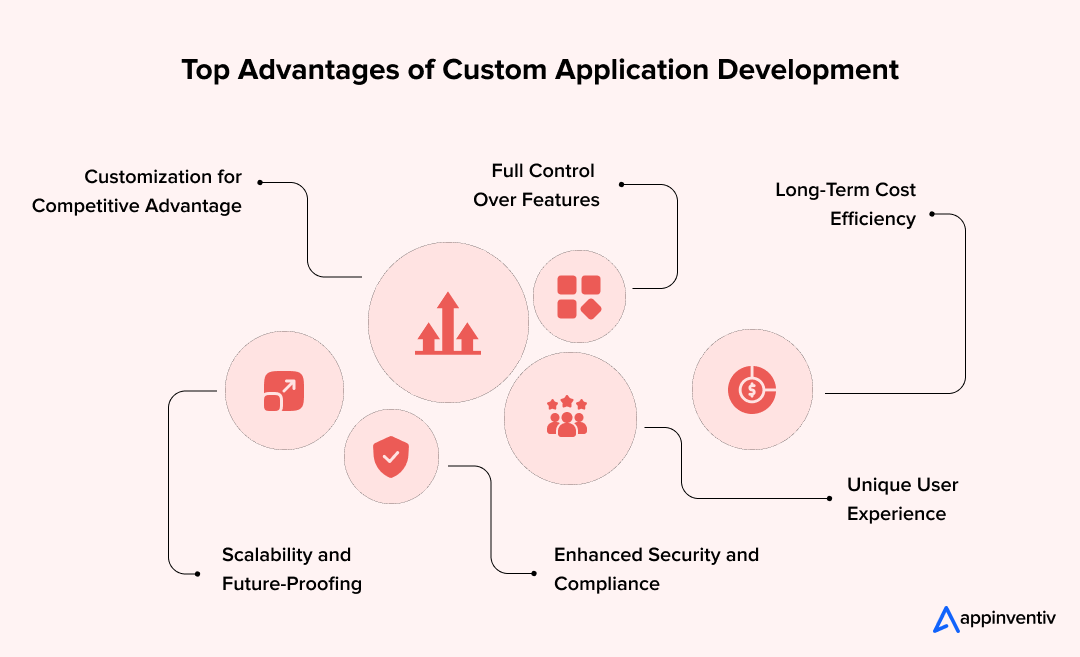
Customization for Competitive Advantage
Custom development allows businesses to create solutions tailored specifically to their needs, offering a strategic advantage over competitors. Unlike white-label solutions, which are standardized, custom solutions provide flexibility in addressing unique business challenges.
With full control over features, businesses can design systems that align with their vision and deliver a more personalized customer experience. This ability to innovate sets your business apart and provides a long-term competitive edge.
Scalability and Future-Proofing
One of the major benefits of custom development is scalability. As your business grows and evolves, custom solutions can be adapted to meet new requirements without the need for complete overhauls. In comparison, white-label solutions may face limitations as your business expands.
Custom software development ensures that your solution is built with scalability in mind, making it easier to integrate new technologies, handle increased data, and stay relevant as your business continues to grow.
Also Read: Application Scalability – Future-Proofing Your App for Long-Term Success
Full Control Over Features
In the custom development vs white label comparison, control and flexibility are major differentiators. With custom development, you have complete authority over the features and functionality of your solution. You’re not confined by the limitations of white-label options, which typically offer predefined features and restricted customization.
Custom solutions are built to align precisely with your business needs, enabling you to design systems that support your unique processes, leading to greater efficiency, adaptability, and user satisfaction.
Enhanced Security and Compliance
For industries with strict regulations, custom development offers the ability to implement advanced security features and ensure compliance with industry standards. Unlike white-label solutions, which may have generic security protocols, custom software can be built with the specific security and compliance requirements in mind, such as HIPAA for healthcare or PCI DSS for financial services. This provides businesses with more control over data privacy, ensuring that sensitive information is protected.
Long-Term Cost Efficiency
Although custom development requires a higher upfront investment, it can be more cost-effective in the long run compared to white-label solutions. White-label products often come with recurring licensing or subscription fees, whereas custom solutions eliminate these costs.
Over time, custom solutions can lead to significant savings by reducing dependency on third-party providers and offering more tailored features that optimize your operations, making it a more sustainable investment.
Unique User Experience
When it comes to custom development vs white label, user experience is a defining factor. With custom development, you can craft a fully tailored experience that reflects your brand identity and addresses your customers’ unique needs.
In contrast, white-label solutions typically come with standard interfaces and limited design flexibility. Custom solutions empower you to build an intuitive, engaging, and branded experience, enhancing customer satisfaction, boosting loyalty, and driving long-term business growth.
Talking about enhancing user experience, Appinventiv revamped Domino’s app experience with a user-first approach, resulting in a 23% boost in conversion rates. By transforming the UI/UX, we turned passive visitors into active users who now explore the app with ease and intent.
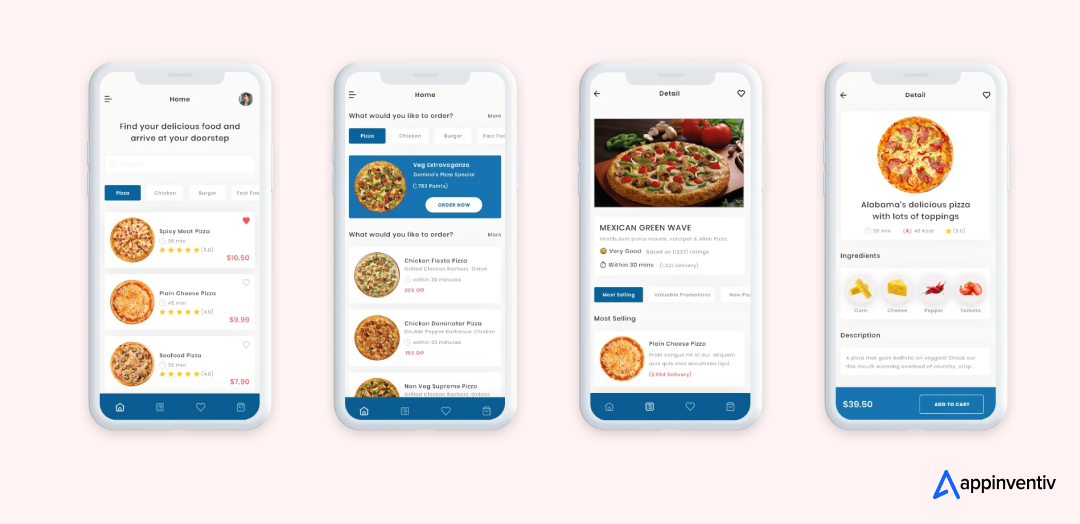
Key enhancements included intuitive menu filtering, seamless order customization, real-time delivery tracking, and secure in-app payments—all designed to make the ordering process faster, smoother, and more engaging for users.
Challenges of Custom Development
White-label solutions provide quick deployment and lower costs, making them ideal for fast market entry. However, they often lack customization, scalability, and may fall short on compliance.
Custom development, on the other hand, delivers fully tailored solutions designed to scale with your business, meet industry regulations, and support complex needs. With complete control and flexibility, it empowers innovation, adaptability, and long-term competitive advantage.
Key Benefits of White Label Solutions
White-label solutions offer businesses a quick, cost-effective way to enter the market with a proven product. The key benefits include faster deployment, lower initial costs, and reduced development time.
However, the challenge lies in the limited customization options and scalability, which may hinder differentiation and future growth as your business evolves. While perfect for simpler, off-the-shelf needs, white-label solutions may not always align with unique or complex business requirements. Let’s have a look at both:
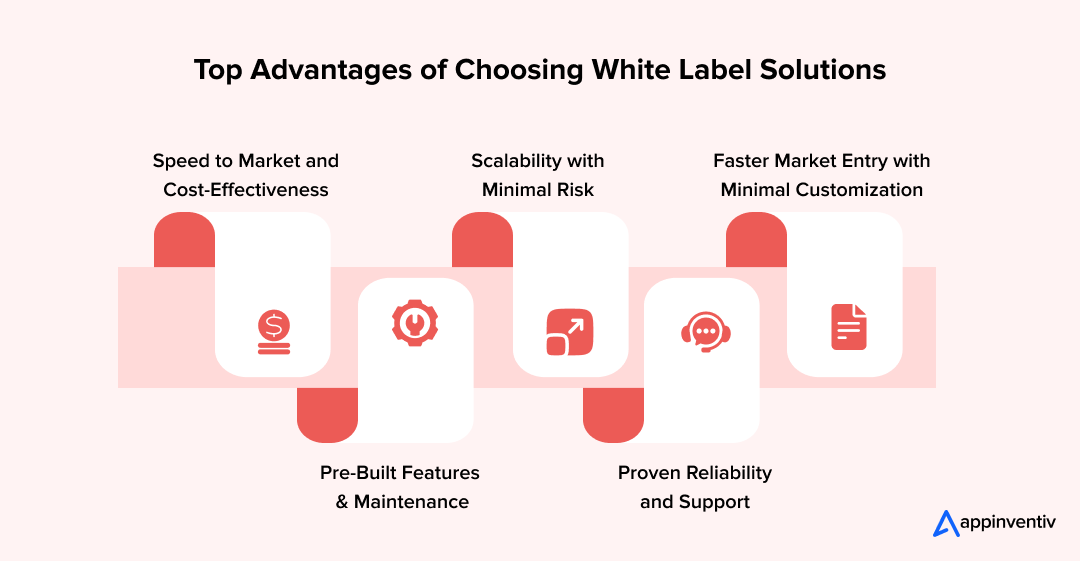
Speed to Market and Cost-Effectiveness
White-labeled services are designed to help businesses quickly launch their products without the extended timelines required for custom development. Instead of spending months or even years developing a solution from scratch, companies can deploy white-label app development solutions in just weeks or days.
This speed is crucial in industries where time-to-market is a competitive advantage. Moreover, using white-label services enables businesses to avoid significant upfront costs associated with custom software development, allowing them to focus their resources on marketing and customer acquisition.
Pre-Built Features and Maintenance
In the custom development vs white label discussion, one of the key advantages of white-label app development is its access to pre-built, proven features. These solutions are extensively tested, refined, and debugged through real-world use. By leveraging white-labeled services, businesses benefit from the collective experience of a broad user base, which continuously improves the platform’s functionality.
Moreover, updates and maintenance are managed by the provider, reducing operational overhead. This allows businesses to focus on scaling and marketing, while the provider ensures the platform remains secure and up to date.
Scalability with Minimal Risk
White-label solutions allow businesses to scale with minimal risk and effort. These platforms can be easily upgraded to add new features or accommodate increased traffic, making them ideal for growing businesses.
White-label app development provides scalability without the need for significant investment in new infrastructure, unlike custom software development services, which often require larger investments to scale. This flexibility makes white-label services an attractive option for startups or businesses that are uncertain about long-term needs but still want to plan for future growth.
Proven Reliability and Support
One of the key benefits of white-label services is their proven reliability. These platforms are thoroughly tested, with bugs and issues resolved before they reach businesses. Additionally, white-label solutions come with built-in support from the provider, ensuring that any issues are resolved quickly.
This is a significant advantage for companies that lack the internal resources or expertise needed for maintaining custom solutions. In comparison, custom software development services may require dedicated in-house teams to provide continuous maintenance and support, which can be costly and resource-intensive.
Faster Market Entry with Minimal Customization
For businesses with limited resources or those testing new ideas, white-label app development offers a fast and affordable entry into the market. These platforms can be quickly rebranded and adapted to meet basic business requirements, allowing companies to test their products in real-world conditions without extensive customization.
With white-label services, businesses can gain a competitive edge in the market and, if needed, transition to custom software development to meet more specific needs or offer more complex features as the business evolves.
Challenges in White Label Software Development
While white-label solutions offer fast deployment and cost efficiency, they come with limitations, especially in terms of customization. Businesses are often constrained by the platform’s pre-built features, which may not fully align with specific business processes or customer needs.
This lack of flexibility can make it difficult to differentiate your brand or create a truly unique user experience, especially in competitive markets where innovation is key. Let’s have a look at the main challenges of white label software.
Limitations in Flexibility and Customization
The main drawback of white-label solutions lies in the limited customization and flexibility. While you can apply your branding and tweak some settings, you’re restricted by the platform’s inherent capabilities and design. This can be challenging if your business has unique requirements or if you want to implement innovative features that differentiate your product from competitors.
In these cases, businesses might find themselves working around the constraints of the white-label app development platform instead of optimizing the solution to meet their needs perfectly. The ability to fully tailor the product is one area where custom development vs white label often comes into play, as custom-built solutions offer far more flexibility in design and functionality.
Security and Compliance Issues
When using third-party white-labeled services, businesses face challenges around data security and compliance. Trusting another organization with sensitive data means that you need to thoroughly evaluate their security practices, compliance certifications, and data handling protocols. This is especially important in industries such as healthcare (HIPAA), finance (PCI DSS), or European businesses (GDPR), where strict regulatory standards must be met.
In cases like this, white-label app development may not always provide the level of customization needed to meet industry-specific security and compliance standards. The shared responsibility model requires you to carefully understand which aspects of security and compliance are handled by the provider and which ones remain your responsibility.
Also Read: The Good, Bad & Ugly of White Label App Development
Key Considerations in Decision-Making: Custom Development and White Label Solutions
The decision in the custom development vs white label debate should be guided by your specific business context, not general preferences. Several critical factors, such as budget, timeline, scalability, and unique requirements, should inform your choice. Let’s have a detailed look at those.
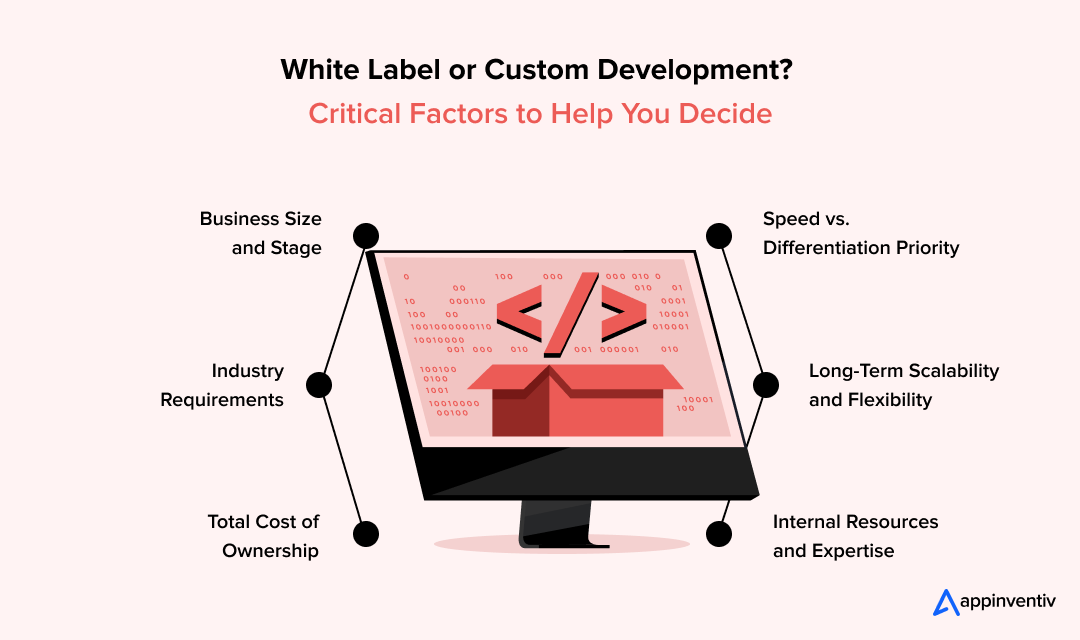
Business Size and Stage
Early-stage startups typically benefit from white-label solutions because they enable rapid market entry with minimal investment. This approach helps validate ideas quickly, keeping overheads low while assessing market demand.
On the other hand, larger businesses or those in growth stages with established models may prefer custom development. Custom solutions offer scalability, control, and the flexibility to build features that align with long-term strategic goals.
Speed vs. Differentiation Priority
In the debate of custom software vs white label software, the right choice often comes down to your business priorities. If time-to-market is critical—whether to gain a competitive edge, meet investor deadlines, or capitalize on emerging trends—white-label solutions offer a fast track to launch with minimal development effort.
However, if your business’s strength lies in delivering unique features, personalized user experiences, or specialized workflows, then custom software is the clear winner. It gives you full control to build a solution tailored to your specific goals, helping you stand out in a crowded market.
Industry Requirements
Certain industries, such as healthcare, finance, and law, have stringent regulatory requirements that often necessitate custom solutions. Compliance with industry standards, data privacy regulations, and security protocols can be difficult to achieve with white-label platforms, which are designed to meet general needs.
Custom development, on the other hand, allows businesses to tailor their solutions to meet these requirements while ensuring optimal functionality specific to their operations.
Long-Term Scalability and Flexibility
In the custom development vs white label evaluation, scalability is a crucial consideration for future growth. Custom development provides the flexibility to adapt and scale your solution as your business evolves, without the limitations often found in off-the-shelf software. While white-label solutions may suffice for smaller operations or less complex needs, they can become restrictive as your business expands or shifts in response to market demands.
Total Cost of Ownership
While white-label solutions are cost-effective in the short term, they can incur ongoing fees such as licensing or subscription costs. These costs can add up over time, especially if the solution doesn’t evolve with your business needs. Custom development, though more expensive initially, can offer a lower total cost of ownership in the long run, as there are no recurring licensing fees, and the solution is built to serve your business over time without being dependent on third-party vendors.
Internal Resources and Expertise
If your business has the technical expertise and resources to manage development in-house, custom development offers more control and potentially lower long-term costs. However, if your company lacks development capacity or prefers to focus on core competencies such as marketing or sales, white-label solutions can help you quickly deploy a product without needing to build a tech team from scratch.
Cost Analysis: Custom Software Vs White Label Software
The cost of custom software vs white-label is a key factor in deciding between the two approaches. White-label solutions offer lower upfront costs, as they are pre-built and ready to deploy. In contrast, custom software development services require a higher initial investment for tailored solutions.
However, over time, custom development can be more cost-effective, eliminating ongoing licensing fees associated with white-label solutions. The right choice depends on balancing short-term costs with long-term scalability and needs.
Cost Range Overview:
- Custom Development: Typically ranges from $50,000 to $500,000+ depending on the complexity, features, and industry-specific requirements. The cost will be higher for highly complex solutions, extensive customization, or integrations with legacy systems.
- White-Label Solutions: Generally range from $5,000 to $50,000+ for initial setup, with ongoing licensing or subscription fees ranging from $500 to $10,000+ per month, depending on the provider and additional features.
Below is a detailed breakdown of the costs associated with each approach, as well as guidance on when one might make more financial sense than the other.
| Aspect |
Custom Development |
White-Label Solutions |
| Initial Investment |
$50,000 to $500,000+: High upfront costs for custom design, development, and testing, depending on complexity and business requirements. |
$5,000 to $50,000+: Low upfront cost for rebranding and minor customizations to an existing platform. |
| Ongoing Maintenance Costs |
$10,000 to $100,000+/year: Higher costs for bug fixes, updates, and additional features, as ongoing development and internal resources are needed. |
$500 to $10,000+/month: Ongoing subscription fees or licensing costs. Providers usually handle updates, reducing maintenance burden. |
| Scalability Costs |
$10,000 to $200,000+: As the business grows, additional development is needed to scale the solution, especially when new features or integrations are required. |
$500 to $5,000+/month: Limited scalability unless businesses opt for premium plans or add-ons for additional features or user capacity. |
| Long-Term ROI |
Custom development often provides better long-term ROI due to the lack of recurring fees and the ability to evolve with your business without external dependencies. |
White-label solutions tend to have a lower long-term ROI due to recurring fees and limited ability to scale and customize according to unique business needs. |
Implementation Timeline: Custom Software Vs White Label Software
The timeline for implementing custom development and white-label solutions can vary significantly based on the complexity of the project and the requirements of your business. Understanding the time it will take to launch your solution is critical when planning your business strategy. Here’s a breakdown of the implementation timelines for both approaches:
| Aspect |
Custom Development |
White-Label Solutions |
| Initial Setup and Planning |
1–2 months: Involves defining requirements, scope, and planning the project. |
1–2 weeks: Quick setup with branding and basic customization. |
| Development & Customization |
3–9 months: Full development, including coding and testing custom features. |
2–6 weeks: Customizations like branding and minor feature adjustments. |
| Testing & Quality Assurance |
1–2 months: Extensive testing to ensure functionality and performance. |
1–2 weeks: Limited testing for custom features and integrations. |
| Deployment & Launch |
1 month: Post-launch adjustments may be required. |
1–2 weeks: Quick deployment with minimal adjustments needed. |
| Total Time to Market |
4–12 months: Custom solutions typically take several months to over a year, depending on complexity. |
1–3 months: White-label solutions can go to market much faster. |
When to Choose White-Label Solutions
White-label solutions are ideal for businesses that need a quick, cost-effective way to enter the market. Here are the scenarios when white labeled services make the most sense:
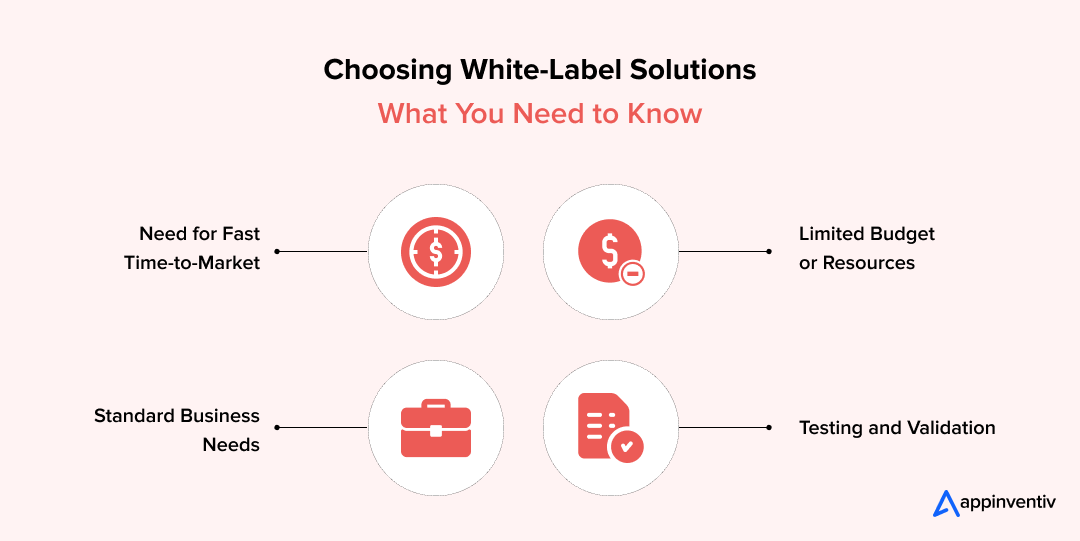
Need for Fast Time-to-Market
If you are looking to launch a product quickly without getting bogged down by development timelines, white-label solutions are the way to go. They are pre-built and can be customized to your branding and minimal features within a short period, typically ranging from a few weeks to a couple of months.
Limited Budget or Resources
White-label solutions offer a cost-effective approach. With fewer upfront costs and reduced development time, they are perfect for startups or businesses with a limited budget who need a reliable solution without the hefty investment in custom development.
Standard Business Needs
If your business requires a common set of functionalities that don’t need much customization (like a CRM, eCommerce platform, or basic SaaS), white-label solutions can help you hit the ground running without overcomplicating things.
Testing and Validation
For businesses that are in their early stages and want to test a concept or product in the market, white-label solutions allow you to launch quickly and make necessary adjustments based on customer feedback. It minimizes the risk of a large investment in custom development before you know your product will succeed.
When to Choose Custom Development
Custom development is the ideal choice for businesses that require tailored solutions and are prepared for a larger investment. Here are the scenarios when custom development should be considered:
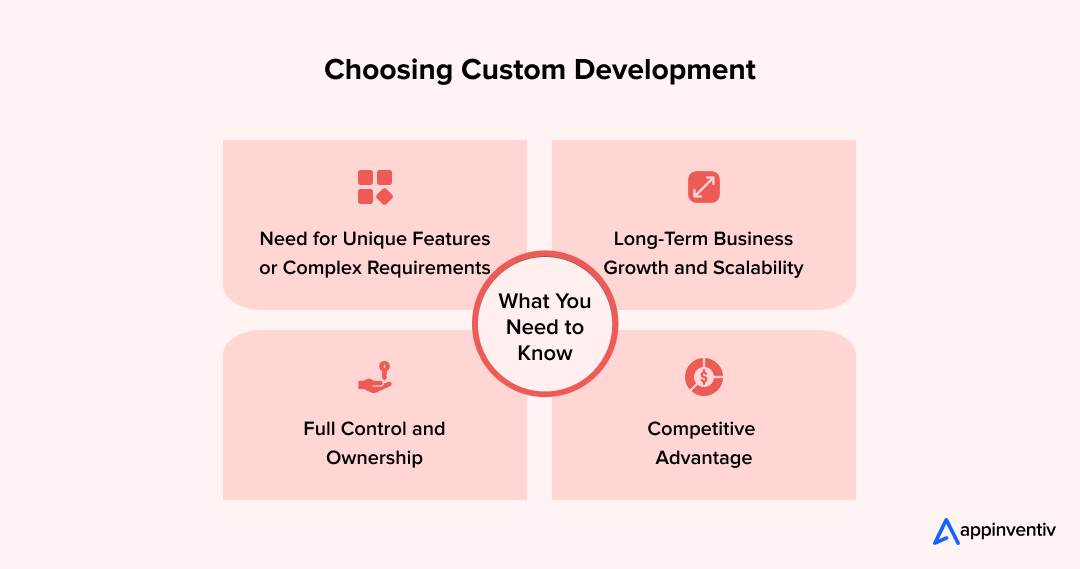
Need for Unique Features or Complex Requirements
Suppose your business requires unique features or needs to address specific operational challenges that off-the-shelf products can’t accommodate. In that case, custom development will provide a tailored solution built around your exact specifications. This is especially important for highly specialized industries such as healthcare, fintech, or logistics.
Long-Term Business Growth and Scalability
In the custom development vs white label comparison, scalability is a key differentiator. Custom development enables your solution to grow seamlessly in tandem with your business. Unlike white-label products, which often come with limitations in scalability and flexibility, custom solutions can be continuously enhanced and expanded to meet your evolving needs, ensuring long-term sustainability and adaptability.
Full Control and Ownership
With custom development, you own the entire product. This gives you full control over features, data security, integration with other systems, and any future updates. If data privacy, security, or integration with legacy systems is a top concern for your business, custom development is the ideal choice.
Competitive Advantage
If your business is competing in a market where differentiation is key, custom development offers the chance to build a unique product that stands out from competitors using white-label solutions. By incorporating innovative features that align with your brand’s vision, you can create a product that provides a competitive edge.
Non-Subscription-Based Customized Solutions
If your business model favors a one-time investment over ongoing licensing fees, custom development offers the flexibility to avoid recurring subscription costs. This can lead to long-term savings and more predictable financial planning.
Custom Development or White-Label: Who is the Winner?
Choosing between custom and white label development depends on your business’s specific needs, goals, and available resources. There’s no one-size-fits-all approach, and both models come with distinct advantages.
White-label solutions excel when time-to-market, cost-efficiency, and minimal customization are key. They are perfect for startups, smaller businesses, or those looking to quickly scale with a proven product. If you need a functional product to test in the market without significant upfront investment, a white-label solution is the ideal choice.
On the other hand, custom development is the winner when your business demands unique features, higher scalability, or complete control over the solution. It’s the preferred option for industries with specialized requirements, like healthcare or fintech, and for businesses with long-term growth in mind. While it requires a higher initial investment and longer implementation timeline, custom development provides a tailored solution that evolves as your business grows, ensuring you stay ahead of the competition.
Final Winner?
When weighing custom development vs white label, the right choice depends on your strategic goals and available resources. If you’re seeking a fast, low-risk way to launch and validate your product, a white-label solution can get you to market quickly. However, if your focus is on building a long-term, scalable business with unique features that align with your vision and industry demands, custom development is the better path forward.
How Appinventiv Can Help You Make the Right Choice
As businesses continue to scale and market dynamics become increasingly competitive, custom software development services are poised to take center stage for companies that need to stay ahead of the curve. The ability to adapt and innovate will be critical in the coming years, especially for businesses in industries like fintech, healthcare, and logistics, where unique functionality and scalability are crucial.
While white-label solutions will continue to serve as a fast and affordable entry point for startups and smaller businesses, they may face limitations as industries demand more personalized, complex solutions.
At Appinventiv, we understand that the decision between custom development and white-label solutions can profoundly impact your business. Whether you choose to go with a white-label solution for its speed and cost-effectiveness or opt for our custom mobile app development services to build a solution that can scale with your business, we are here to guide you every step of the way.
Our team has collaborated with global leaders such as KFC, IKEA, Pizza Hut, and Domino’s on custom app development, enhancing customer engagement, and streamlining ordering systems. Additionally, we assisted ILITY with white-label development, enabling rapid scaling through a reliable, branded solution.
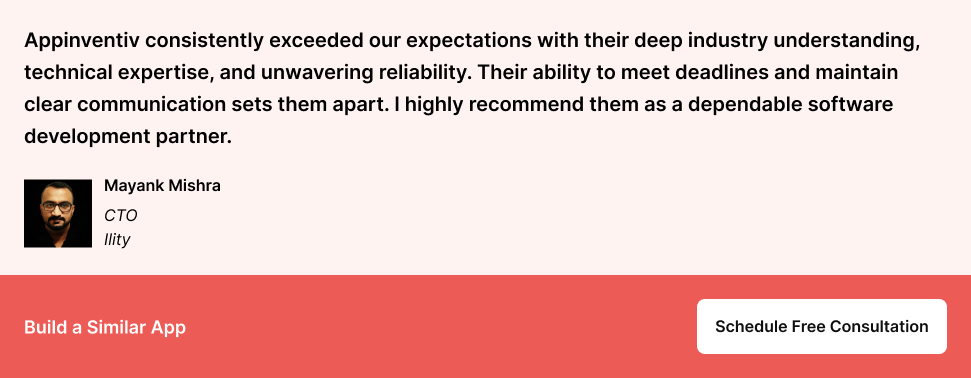
We begin by evaluating your business objectives, long-term vision, and market positioning. Our experts carefully evaluate both sides of the custom development vs white label equation to identify the most suitable approach for your unique business needs. In a future shaped by adaptability and innovation, we help you choose the right solution to keep your business competitive and future-ready.
Connect with our experts now!
FAQs
Q. Is white label software right for my business?
A. White-label software is ideal for businesses that need a quick, cost-effective solution with minimal customization. It’s perfect for startups or companies aiming for a fast market entry, especially when your business needs are relatively standard and don’t require a high level of differentiation. However, if you need white-label solutions tailored to your specific requirements, custom development might be a better fit.
Q. Which is more cost-effective: custom or white label?
A. White-label solutions are generally more cost-effective upfront. They eliminate the need for extensive development, reducing the time and resources required to launch. Custom development, while more expensive initially, provides a tailored solution that can scale with your business needs over time, offering more long-term value if unique features and scalability are essential for your business.
Q. How scalable is white label software?
A. White-label software is usually limited in scalability compared to custom solutions. While it can handle growth to a certain extent, businesses may encounter challenges as they expand, particularly if they require more advanced features or integrations. Some white-label providers offer scalable plans, but significant customization and flexibility may be restricted.
Q. What is the difference between white label and custom development?
A. The main difference between custom development vs white label lies in the level of customization and control. Custom development allows businesses to create a completely tailored solution that meets their unique needs. This provides full control over features, functionality, and scalability, making it ideal for businesses that need highly specialized solutions. However, custom development typically requires a higher initial investment and a longer timeline for implementation.
On the other hand, white label solutions are pre-built products that can be branded and deployed quickly. They are a cost-effective and fast way to launch a product, especially for businesses with more standard needs. While they are less expensive and faster to implement, white-label solutions lack the flexibility and customization options of custom development, making them less suitable for businesses with specific or complex requirements.
Q. What are the main types of custom software development and white-label software solutions?
A. In custom software development, the most common types include:
- Enterprise Software Development: Tailored solutions for large organizations to enhance internal operations, such as custom-built ERP systems or CRM platforms.
- Mobile App Development: Custom mobile applications designed to address specific business needs, providing unique user experiences and brand engagement.
- E-commerce Development: Custom-built online stores that cater to a business’s sales model, customer journey, and unique operational workflow.
- SaaS Development: Tailored software-as-a-service platforms that offer cloud-based solutions specific to the needs of a business, providing scalability and flexibility.
On the other hand, white-label software solutions typically include:
- White-Label E-commerce Platforms: Pre-built e-commerce solutions, like Shopify or BigCommerce, that businesses can rebrand and launch quickly.
- White-Label CRM Systems: Off-the-shelf customer relationship management platforms that can be customized and branded for various industries.
- White-Label SaaS Solutions: Ready-made software platforms, such as project management tools (e.g., Trello, Asana), that businesses can rebrand and use for their own purposes.
- White-Label Mobile Apps: Pre-developed apps in categories like food delivery, fitness, or education that businesses can rebrand and launch without major development.
- White-Label Exchange Platforms: Pre-built trading platforms, especially in cryptocurrency, that can be rebranded and deployed by businesses looking to enter the exchange market quickly.
- White-Label Modular Solutions: Flexible, pre-built platforms offering core functionalities (like e-commerce or CRM) that businesses can customize by adding specific modules suited to their needs.
Q. What are some of the pros and cons of white label solutions?
A. White-label solutions offer a quick and cost-effective path to market, but they come with trade-offs. Here’s a look at the key pros and cons to consider:
Pros of White-Label Solutions
- Faster Time to Market
- Lower Upfront Costs
- Minimal Technical Expertise Required
- Proven, Tested Products
- Easy Branding
Cons of White-Label Solutions
- Limited Customization
- Lack of Competitive Differentiation
- Ongoing Subscription Fees
- Limited Control & Owners
IT Managed & Outsourcing
Didn't find what you're looking for? Let us know your needs, and we'll tailor a solution just for you.








